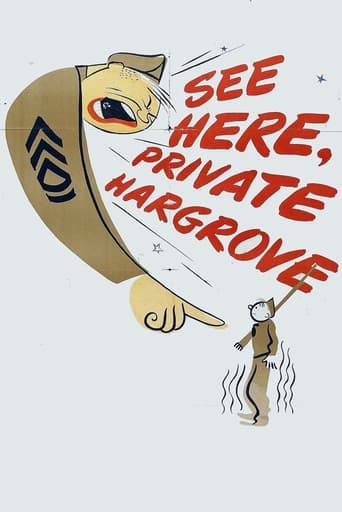JohnHowardReid
Robert Walker (Marion Hargrove), Donna Reed (Carol Holiday), Robert Benchley (Holiday), Keenan Wynn (Mulvehill), Grant Mitchell (Uncle George), Ray Collins (Brody S. Griffith), Chill Wills (Sergeant Cramp), George Offerman, jr (Orrin Esty), William "Bill" Phillips (Bill Burk), Marta Linden (Mrs Holiday), Bob Crosby (Bob), Edward Fielding (General Dillon), Donald Curtis (Sergeant Heldon), Douglas Fowley (Captain R.S. Manville), Eddie Aciff (Captain Hammond), Morris Ankrum (Colonel Forbes), Louis Jean Heydt (swearing-in captain), Mantan Moreland (porter), Harry Tyler (train passenger), Connie Gilchrist (farmer's wife), Arthur Walsh (conscriptee with glasses), Ray Teal (public relations), James Warren, Dennis Moore (executive officers), Frank Faylen (military policeman at railroad terminal), Joe Devlin (garbage bin sergeant), Mary McLeod (clerk), Jack Luden (doctor), Louis Mason (farmer), Harry Strang (captain), Eddie Hall (soldier who directs Hargrove to C.O.), Steve Barclay, Ken Scott (corporals), Blake Edwards, Rod Bacon (field operators), Myron Healey, Maurice Murphy, Fred Kohler, jr (lieutenants), John Kelly (exercise sergeant), William Newell (Smith), Michael Owen (officer of the day), Mickey Rentschler (sergeant), Clarence Straight (Captain Hamilton).Director: WESLEY RUGGLES. Additional scenes directed by Tay Garnett. Screenplay: Harry Kurnitz. Based on the 1942 book by Marion Hargrove. Photography: Charles Lawton. Film editor: Frank E. Hull. Art directors: Cedric Gibbons and Stephen Goosson. Set decorators: Edwin B. Willis and Ralph S. Hurst. Music: David Snell. Song, "In My Arms" by Frank Loesser (music) and Ted Grouya (lyrics). Costumes designed under the supervision of Irene. Assistant director: Barney Glazer. Sound supervisor: Douglas Shearer. Sound recording engineer: John F. Dullam. Western Electric Sound Recording. Producer: George Haight.Copyright 14 February 1944 by Loew's Inc. A Metro-Goldwyn-Mayor picture. New York opening at the Astor: 21 March 1944. 10 reels. 100 minutes.SYNOPSIS: Marion Hargrove's adventures at an army training camp (Fort Bragg) in North Carolina, NOTES: Fact or fiction? Hargrove's depiction of himself was certainly based on fact. Indeed, by the time the movie was released, he had been promoted to sergeant.COMMENT: An amusing yet realistic account of life in a boot camp, this movie was directed with a certain amount of flair by Wesley Ruggles. It's also well acted by young Robert Walker, who receives good support all the way down the line. Although her role is small (despite her second billing), Donna Reed is also most attractively presented. Chill Wills likewise makes quite an impression as the hard-bitten sergeant. The movie was extremely successful and a follow-up, "What Next Corporal Hargrove", followed in 1945.
Ethereal-Cloud
If you loved the movie Stripes, and who didn't, this is basically the World War II version and dare I say made me laugh out loud more. I will agree with some of the other reviewers that a bit of the movie is a little dated but come on folks it's 68 years old.Robert Walker as the guy who just couldn't seem to follow Army protocol no matter how hard he tried, until he meets Donna Reeds' character was both funny and sweet. Both gave a great performance as did the supporting cast, and the movie was actually a big hit with G.I.s serving overseas when the movie was released. If you get the chance to check this out I don't think you'll be disappointed, It actually is laugh out loud funny.



